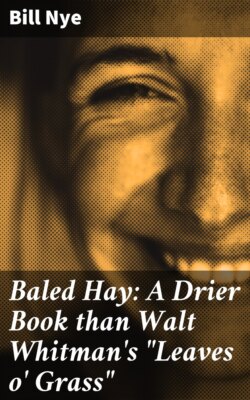Читать книгу Baled Hay: A Drier Book than Walt Whitman's "Leaves o' Grass" - Nye Bill - Страница 28
На сайте Литреса книга снята с продажи.
THE MAN WHO INTERRUPTS.
ОглавлениеTable of Contents
I DO not, as a rule, thirst for the blood of my fellow-man. I am willing that the law should in all ordinary cases take its course, but when we begin to discuss the man who breaks into a conversation and ruins it with his own irrelevant ideas, regardless of the feelings of humanity, I am not a law and order man. The spirit of the "Red Vigilanter" is roused in my breast and I hunger for the blood of that man.
Interrupters are of two classes: First, the common plug who thinks aloud, and whose conversation wanders with his so-called mind. He breaks into the saddest and sweetest of sentiment, and the choicest and most tearful of pathos, with the remorseless ignorance that marks a stump-tail cow in a dahlia bed. He is the bull in my china shop, the wormwood in my wine, and the kerosene in my maple syrup. I am shy in conversation, and my unfettered flights of poesy and sentiment are rare, but this man is always near to mar all with a remark, or a marginal note, or a story or a bit of politics, ready to bust my beautiful dream and make me wish that his name might be carved on a marble slab in some quiet cemetery, far away.
Dear reader, did you ever meet this man—or his wife? Did you ever strike some beautiful thought and begin to reel it off to your friends only to be shut off in the middle of a sentence by this choice and banner idiot of conversation? If so, come and sit by me, and you may pour your woes into my ear, and I in turn will pour a few gallons into your listening ear.
I do not care to talk more than my share of the time, but I would be glad to arrive at a conclusion just to see how it would seem. I would be so pleased and so joyous to follow up an anecdote till I had reached the "nub," as it were, to chase argument home to conviction, and to clinch assertion with authority and evidence.
The second class of interrupters is even worse. It consists of the man—and, I am pained to state, his wife also—who see the general drift of your remarks and finish out your story, your gem of thought or your argument. It is very seldom that they do this as you would do it yourself, but they are kind and thoughtful and their services are always at hand. No matter how busy they may be, they will leave their own work and fly to your aid. With the light of sympathy in their eyes, they rush into the conversation, and, partaking of your own zeal, they take the words from your mouth, and cheerfully suck the juice out of your joke, handing back the rind and hoping for reward. That is where they get left, so far as I am concerned. I am almost always ready to repay rudeness with rudeness, and cold preserved gall with such acrid sarcasm as I may be able to secure at the moment. No one will ever know how I yearn for the blood of the interrupter. At night I camp on his trail, and all the day I thirst for his warm life's current. In my dreams I am cutting his scalp loose with a case-knife, while my fingers are twined in his clustering hair. I walk over him and promenade across his abdomen as I slumber. I hear his ribs crack, and I see his tongue hang over his shoulder as he smiles death's mirthful smile.
I do not interrupt a man no more than I would tell him he lied. I give him a chance to win applause or decomposed eggs from the audience, according to what he has to say, and according to the profundity of his profund. All I want is a similar chance and room according to my strength. Common decency ought to govern conversation without its being necessary to hire an umpire armed with a four-foot club, to announce who is at the bat and who is on deck.
It is only once in a week or two that the angel troubles the waters and stirs up the depths of my conversational powers, and then the chances are that some leprous old nasty toad who has been hanging on the brink of decent society for two weeks, slides in with a low kerplunk, and my fair blossom of thought that has been trying for weeks to bloom, withers and goes to seed, while the man with the chilled steel and copper-riveted brow, and a wad of self-esteem on his intellectual balcony as big as an inkstand, walks slowly away to think of some other dazzling gem, and thus be ready to bust my beautiful phantom, and tear out my high-priced bulbs of fancy the next time I open my mouth.
